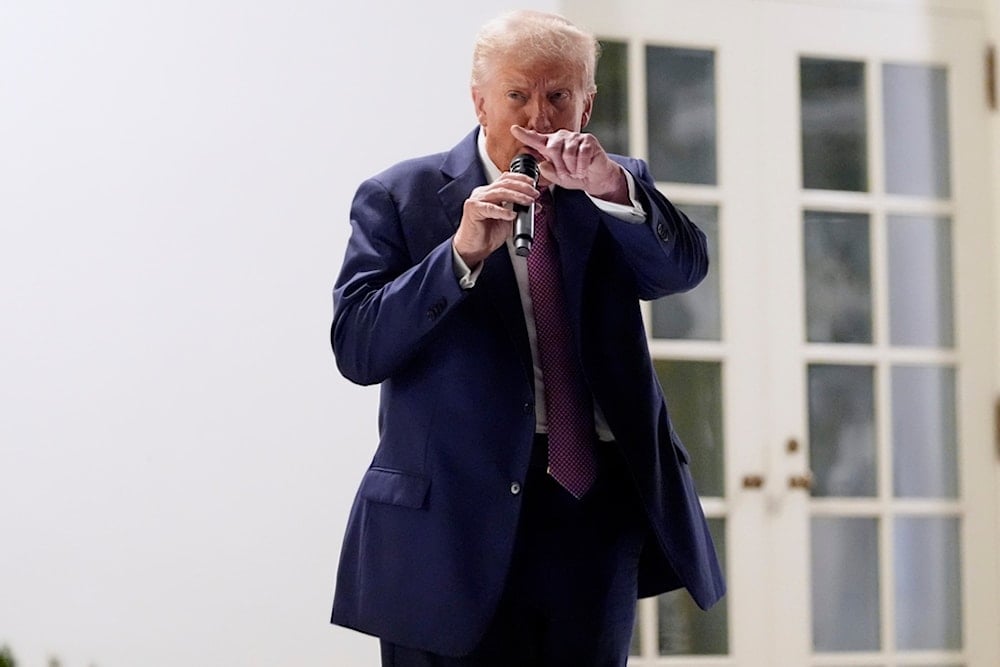Trump issues order sanctioning states accused of detaining US citizens
Trump signs order to sanction and bar leaders from states accused of detaining US citizens, with Iran and Palestine among likely targets.
-

President Donald Trump speaks at a dinner in the Rose Garden of the White House, Friday, September 5, 2025, in Washington (AP)
President Donald Trump signed an executive order on Friday authorizing sanctions and travel restrictions against countries deemed to be engaging in the “wrongful detention” of US citizens.
The move, which comes just two weeks before the UN General Assembly convenes in New York, raises the possibility that foreign leaders accused of such practices could be barred from attending. While officials declined to name countries that might be immediately targeted, they repeatedly cited Iran as a likely candidate.
Administration’s message
Sebastian Gorka, Trump’s counterterrorism director, described the order as “drawing a line in the sand that US citizens will not be used as bargaining chips.” A senior Trump administration official added that travel bans “are one of the most powerful tools we have for regimes who that think they can use our citizens as leveraging tools against the United States.”
“We will rapidly follow this up with use in some countries where we don’t always get along,” another official said.
Hours before the signing, 40 Republican lawmakers sent Trump a letter urging him to deny visas to Iranian President Masoud Pezeshkian and other senior officials. They framed the measure as a stand against Tehran’s alleged "support for terrorism" and "human rights violations".
The administration has already barred Palestinian President Mahmoud Abbas and other senior officials from attending this year’s UN meeting. The decision came as US allies, including the UK, France, Canada, and Australia, prepared to recognize Palestinian statehood, which Washington vehemently rejects.
Scope of restrictions
The state department does not publish a comprehensive list of countries detaining US citizens, but issues “do not travel” advisories for high-risk states such as Venezuela and Russia. Officials said the new designation would be applied to countries engaged in “hostage diplomacy,” with China, Iran, and Afghanistan under review.
Under the 1947 UN Headquarters Agreement, the US is obligated to allow foreign diplomats to attend UN sessions. UN Secretary-General António Guterres has raised concerns with the State Department after Washington blocked Palestinian officials.
US officials have linked the restrictions on Palestinian Authority representatives to their cooperation with international courts investigating the Israeli genocide in Gaza, which has thus far killed 64,000 people over nearly two years.
The Palestinian Authority, which administers parts of the occupied West Bank, is not believed to be detaining American citizens.
US bans PA officials
The United States announced last week that it would deny visas to members of the Palestinian Authority ahead of next month’s United Nations General Assembly, where France and several other nations are preparing to push for the recognition of a Palestinian state.
The move underscores President Donald Trump’s close alignment with the Israeli government, which has long opposed Palestinian statehood.
“Secretary of State Marco Rubio is denying and revoking visas from members of the Palestine Liberation Organization (PLO) and the Palestinian Authority (PA) ahead of the upcoming United Nations General Assembly,” the State Department said in a statement.
According to the statement, the decision reflects Washington’s intent to hold the PLO and PA “accountable for failing to meet their commitments” and for “undermining the prospects for peace.” The Trump administration further accused Palestinian officials of engaging in “lawfare” by appealing to the International Criminal Court and the International Court of Justice to pursue cases against "Israel".
“The Palestinian Authority must end attempts to bypass negotiations through international lawfare campaigns and stop efforts to secure the unilateral recognition of a conjectural Palestinian state,” it added.
Abbas may be barred from attending
It remains unclear if the visa restrictions apply to all Palestinian officials. Palestinian President Mahmoud Abbas had been scheduled to attend the UN session, Palestinian Ambassador Riyadh Mansour told reporters in New York.
“We will see exactly what it means and how it applies to any of our delegation, and we will respond accordingly,” Mansour said regarding the State Department’s decision.
Later, the Palestinian Authority called on the United States to reverse its denial of visas.
In a statement published by the official news agency WAFA, it said the Palestinian presidency "called on the US administration to reconsider and reverse its decision."

 5 Min Read
5 Min Read










